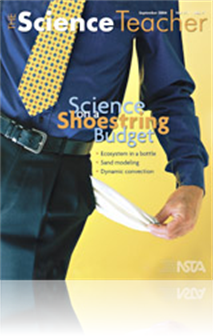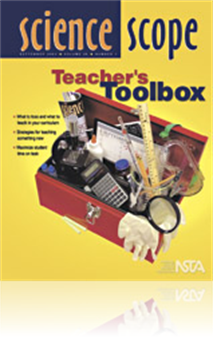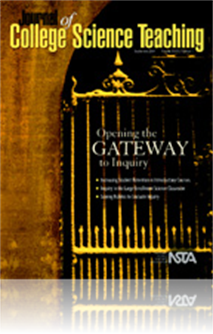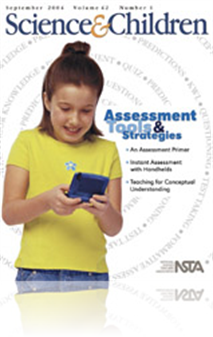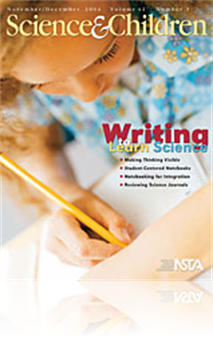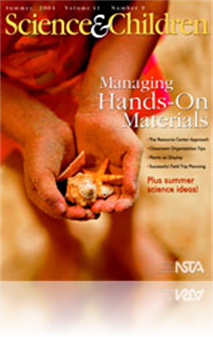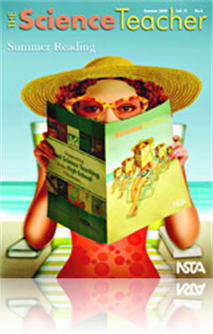All Resources
Journal Article
Earth science teaches know how frustrating it can be to spend hundreds of dollars on three-dimensional (3-D) models of Earth’s geologic features, only to use the models for a few class periods. To avoid emptying an already limited science budget, t...
Journal Article
After the Bell: Creating junior ethologists
Did you ever think that observing your dog, cat, fish, bird, or reptile could prepare you for long-term science investigations? Indeed it can! The basis for developing scientific thinking is improving observation skills. Through observation, students...
Journal Article
Ask the Experts—September 2004
The experts address the following question in this month’s column: Why do geckos make sounds and why mostly at night?...
Journal Article
Astrobiology is a relatively new field of study in science, one that has found a home in the curriculum of many universities. At the middle level, this multidisciplinary field is an exciting mix of topics and questions that can help students see how ...
Journal Article
Just for once, skip the usual first day of school routine that includes seating charts, questionnaires, textbook distribution, and so on, and try a little science instead. By implementing this inquiry-based lesson into your science curriculum, studen...
Journal Article
Typically, teachers use simple models that employ differences in temperature and density to help students visualize convection. However, most of these models are incomplete or merely hint at (instead of model) convective circulation. In order to make...
Journal Article
Favorite Demonstration: MOM Teaches Chemistry
Bring in an expert to demonstrate simple chemistry concepts—MOM! Milk of Magnesia (MOM) is used in this practical demonstration that is simple to do, safe to perform, and engages students as they try to figure out and hypothesize what’s going on....
Journal Article
The Gateway Science Workshop is a peer-facilitated, problem-focused program designed to improve student retention in the sciences. This article discusses its development, implementation, and efficacy, which is demonstrated by higher retention of work...
Journal Article
Every student should be provided with high quality teaches who provide high quality instruction in support of student learning and achievement. So then the question is, “How do we make that happen?” Basically, there are two strategies that teache...
Journal Article
Students use deductive reasoning and their powers of observation to identify mystery items in a sealed, brown-paper bag. By using items such as bells, bags of water, coffee beans, and bags of frozen vegetables, teachers can encourage students to util...
Journal Article
Idea Bank: Roller Coaster Inquiry
This project, which centers on roller coaster design, engages students in learning about physics and activates their prior knowledge in an open-inquiry environment. The activity also gets students involved with inquiry and group work during the first...
Journal Article
Editor's Note (September 2004)
The act of having students commit to an outcome makes them think. It is different than oral brainstorming because everyone is accountable. Students may not volunteer exactly what they are thinking. Like everyone else, they may just summarize. Stu...
Journal Article
Editor's Corner: May You Live in Interesting Times!
As the 2004-2005 began, science teachers were faced with unprecedented challenges. Limited budgets were stretched to the breaking point. The mandates of No Child Left Behind (NCLB), state and national standards, and high-stakes testing required teach...
Journal Article
Assessment strategies do not have to be complicated in order to inform both learning and teaching. Assessment strategies described in this article include student drawings, journal entries, lists, dramatizations, individual interviews, constructions,...
Journal Article
Fostering Inquiry in Nonlaboratory Settings
Inquiry is an important learning strategy, even for students who cannot or do not perform actual experiments. The authors describe two activities, other than experimentation, that they used in introductory biology learning groups to emphasize inquiry...
Journal Article
For several decades, science teachers have used bottles for classroom projects designed to teach students about biology. A model terrarium enclosed in a glass bottle was described in the 1975 edition of Science and Children (Ochs and Brock 1975). S...
Journal Article
Many physics teachers have an unclear understanding of Bernoulli’s principle, particularly when the principle is applied to aerodynamic lift. Some teachers favor using Newton’s laws instead of Bernoulli’s principle to explain the physics behind...
Journal Article
Scope on the Skies: September in the skies
Although there weren't any visible planets at the beginning of the September 2004 school year, there were plenty of other celestial thrills to make up for it. These include the strangely shaped asteroid Toutatis that tumbled past the Earth, coming wi...
Journal Article
Adventures in Exercise Physiology
The author altered the format of an exercise physiology course from traditional lecture to emphasizing daily reading quizzes and group problem-solving activities. The SALGains evaluation was used to compare the two approaches and significant improvem...
Journal Article
Using microbiology activities in the classroom is an effective way for teachers to address National Standards in the life sciences. However, they could be too risky to implement due to the likelihood of cultivating human pathogens. In addition, makin...
Journal Article
Craftsman/NSTA Young Inventors Awards Program—Students of Invention
Thomas A. Edison said, "To invent, you need a good imagination and a pile of junk." Well, the finalists in this year's Craftsman/NSTA Young Inventors Award Program had no shortage of imagination but chose more useful items with which to work. With t...
Journal Article
Science demonstrations can be excellent tools for capturing students' attention. This "magic trick" involves Super Gel (sodium polyacrylate) and "disappearing" water. This inquiry-based activity is designed to stimulate critical thinking and develop ...
Journal Article
NASA "ROCKS" Problem-Based Learning
With the National Science Education Standards as a driving force behind instruction, science educators must move toward classroom activities that allow students to guide their own learning experiences and form their own questions for investigation in...
Journal Article
Capture your students’ attention on the first day of school by breaking from the usual routine of reviewing class expectations, rules, and the course syllabus. Students will be captivated when you ask them to explain how a balloon was inflated insi...
Journal Article
Idea Bank: Modeling a Sinkhole
Limestone lies underneath approximately 15 percent of the United States. Fractures, cracks, and weaknesses develop due to Earth’s natural processes or manmade sources, resulting in structural change to the limestone. As a result, the formation of s...
Journal Article
While the importance of teamwork is emphasized in the National Science Education Standards, getting teams to share equally in the academic assignments and interact in a positive and productive manner often eludes even the best of teachers. These stra...
Journal Article
Science 101: What causes tides?
Tides exhibit predictable cycles on daily, monthly, and yearly scales. The magnitude of the tides is dependent on the position of the Earth and Moon in relation to the Sun, but is also influenced by other factors. This is a brief introduction to what...
Journal Article
This design challenge required students to design, build, test, and race fuel-cell cars. As part of the Fuel-Cell Car Challenge, student cars had to drive up an inclined plane with increasingly steep angles and compete in a speed race. This activity ...
Journal Article
Zoo projects that encourage reflective learning and are legitimate undertakings for untrained undergraduates are hard to develop. The two themes of the author’s primate studies course lead students to observe and evaluate the social behavior of non...
Journal Article
Providing sun-safe environments, schedules, and activities; teaching and modeling sun-safe behaviors; and implementing a sun-safe school policy are ways that schools can help protect children from sun overexposure and lay the foundation for a healthy...
Journal Article
There has been renewed discussion of the scientific method, with many voices arguing that it presents a very limited or even wholly incorrect image of the way science is really done. At the same time, the idea of a scientific method is pervasive. Thi...
Journal Article
The experts address the following questions in this month’s column: How do sunscreens work? Does baby oil really make you tan faster? Why do some people tan more than others or end up getting a bad sunburn after spending the same amount of time in ...
Journal Article
Editorial: What <em> JCST </em> Can Do for You
In this month’s column, the new Field Editor, Randy Moore, introduces himself and outlines several goals for his 3-year term as editor of JCST. He hopes to continue the tradition of making JCST a leader in college science teaching—as it was u...
Journal Article
A field trip to the shore can engage students in real-world science and offer plentiful opportunities for interdisciplinary learning. This field trip "action plan" ensures that a day at the beach goes smoothly for students and chaperones alike....
Journal Article
Favorite Demonstration: Tips for Using Demonstrations Effectively
Demonstrations are powerful learning tools when properly used in combination with other teaching strategies. They are effective ways to model scientific principles in a manner that allows students to visualize, practice, and apply the information bei...
Journal Article
Teaching Science to the Visually Impaired
Science educators must address the needs of visually impaired students by making the appropriate accommodations in the laboratory and science classroom. This article provides practical strategies for engaging visually impaired students in science-rel...
Journal Article
Tech Trek: Software that makes the grade
As you make plans for the upcoming school year, consider reviewing one of the many gradebook software packages that are available for organizing and computing your classroom grades. Many different packages are available (see Figure 1) which range in ...
Journal Article
Idea Bank: Got Milk? Do Biochemistry
Bacteria are very useful for introducing high school students to biochemical processes in the cell, including the hydrolysis of nutrients, the production of waste products, and changes in pH. All of this can be demonstrated to students using simple m...



